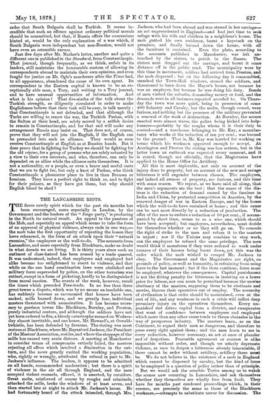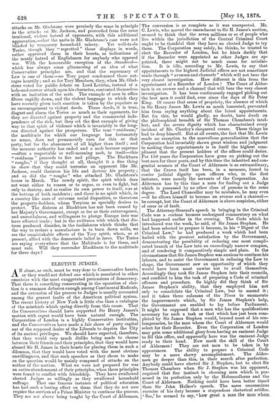THE LANCASHIRE RIOTS.
THE fierce rowdy spirit which for the past six months has been encouraged, more especially in London, by the Government and the leaders of the "Jingo party," is producing in the North its natural result. An appeal to the passions of the Meb, and especially an appeal which seems to take the form of an approval of physical violence, always ends in one way,— the mob take the first opportunity of repeating the lesson they have rehearsed, in the farm of an attack fipon their "natural enemies," the employers or the well-to-do. The accounts from Lancashire, and more especially from Blackburn, make us doubt in what decade we are living. It is thirty years since such an outburst of class-hatred has been roused by a trade quarrel. It was understood, indeed, that employers and employed had alike become too enlightened to resort to violence, and that while on the one hand combination laws were abolished and military force 'superseded by police, on the other terrorism was extinct, except in a form of picketing, hardly to be distinguished from moral suasion. The events of the week, however, recall the times which preceded Free-trade. In no less than three greattowns a dispute, which was by no means an insoluble one, has suddenly become so envenomed that houses have been sacked, mills burned down, and we greatly fear, individual masters threatened with assassination. It has become neces- sary to garrison towns like Blackburn, Burnley, and Preston, purely industrial centres, and although the soldiers have not yet been ordered to fire, a bloody catastrophe seemed on Wednes- day almost inevitable, and one house, Mr. Howard's, at Oswald- twhietle, has been defended by firearms. The rioting was most serious at Blackburn, where Mr. Raynsford Jackson, the President of the Masters' Association, resides, and where the stoppage of the mills has 'caused very acute distress. A meeting at Manchester to consider terms of compromise entirely failed, the masters rejecting all offers which involved a diminution in the out- turn, and the news greatly excited the working population, who, rightly or wrongly, attributed the refusal in part to Mr. Jackson's influence. The leaders, it appears to be admitted on all hands, recommended moderation ; but there is a spirit of violence in the air all through England, and the men accepted violent counsels, offered, it is asserted, by outsiders. Great mobs, reinforced of course by roughs and criminals, attacked the mills, broke the windows of at least seven, and then started late at night to attack Mr. Jackson's house. He hod fortunately heard of the attack intended, through MTV.
Jackson, who had been abroad and was stoned in her carriage— an act unprecedented in England—and had just time to seek refuge with his wife and children in a neighbour's house. The mob gutted his own residence, burnt a haystack on the premises, and finally burned down the house, with all
the furniture it contained. Even the plate, according to the accounts published in Manchester, was left un- touched by the rioters, to perish in the flames. The rioters next dragged out the carriage, and burnt it some distance off in the public road. The municipality were by this time in movement, soldiers had arrived from Preston, and the mob dispersed ; but on the following day it reassembled, smashed the Town-Hall windows, stoned the soldiers, and. threatened to burn down the Mayor's house, not because he was an employer, but because he was doing his duty. Bands of men visited the suburbs, demanding money or food, and the demands were in all instances reported acceded to. On Thurs- day the town was more quiet, being in possession of some 400 Infantry and Cavalry, but the mobs, though cowed, were furious, and nothing but the presence of the military prevented a renewal of the work of destruction. At Burnley, the scenes enacted were almost worse, the police being kicked into help- lessness—probably by the roughs whom it is their duty to control—and a warehouse belonging to Mr. Kay, a manufac- turer who works at the reduction of ten per cent., was burned to the ground. That is, Mr. Kay was harried for working on terms which his workmen approved enough to accept. At- Accrington and Preston the rioting was less serious, but in the latter town an outbreak was expected every moment, and it is stated, though not officially, that the Magistrates have applied to the Home Office for Artillery.
All this is most deplorable, not only on account of the injury done to property, but on account of the new and savage bitterness it will engender between classes. The employees, and indeed all owners of property, are furious, and this time with some reason. We repeat, as we have said all along, that the men's arguments are the best ; that the cause of the dis- tress is the reduction of demand caused by the famines in India and China, by protected competition in America, by the renewed danger of war in Eastern Europe, and by the losses which the well-to-do have sustained at home ; and this cause can be met most directly by a reduction of production. The offer of the men to endure a reduction of 10 per cent., if accom- panied by short time, seems to us a wise one, which should have been accepted ; but employers, nevertheless, must decide for themselves whether or no they will go on. To concede the right of strike to the men and refuse it to the masters is unjust ; nor if the Unions may combine to stop work, can the employers be refused the same privilege. The men would think it monstrous if they were ordered to work under menace of their houses being burnt down, yet this was the order which the mob wished to compel Mr. Jackson to obey. The Government and the Magistrates are right, on grounds of policy, as well as humanity, in refraining from using force to the last moment ; but if the riots continue, force must be employed, whatever the consequences. Capital punishment is not the fitting penalty for bitterness in insisting on a lower price for labour, nor can arson be permitted because the unwise obstinacy of the masters, supposing them to be obstinate and unwise, throws their operatives out of employ. The necessity of civilisation is that order should be maintained, even at the cost of life, and any weakness in such a crisis will inflict deep pecuniary injury on the operatives themselves. Every un- punished riot drives capital from a district, and exasperates that want of confidence between employers and employed which more than any other cause tends to throw obstacles in the way of prosperous industry. The masters learn, as on the Continent, to regard their men as dangerous, and therefore to press every right against them ; and the men learn to see in every reduction, however necessary, an act at once of plunder and of despotism. Peaceable agreement or contest is alike impossible without order, and though we utterly deprecate violence, as sure to deepen a bitterness already lamentable, if- there cannot be order without artillery, artillery there mint be. We do not believe in the existence of a mob in England which cannot be dispersed by cavalry, but the kind of force to be employed is a question of policy rather than of principle.
But we would ask the sensible Tories among us to -watch the scenes now occurring in Lancashire, and ask themselves whether they themselves are wholly free from fault. They have for months past condoned proceedings which, in their essence, are precisely the same as those of the Blackburn work-men,—attempts to substitute terror for discussion. The attacks on Mr. Gladstone were precisely the same in principle as the attacks on Mr. Jackson, and proceeded from the same irrational, violent hatred of opponents, with this additional aggravation,—that the mobs in Mr. Gladstone's case were not blinded by temporary household misery. Yet well-to-do Tories, though they " regretted " those displays in words, rather approved them in their hearts, as indications of the manly hatred of Englishmen for anybody who opposed war. With the honourable exception of the Standard— which has always some glimmering of an idea of what Conservative principles are, and that the supremacy of Law is one of them—no Tory paper condemned those out- rages heartily ; and as for Tory Members, they, when Mr. Glad- stone voted for public debate on Lord Leitrim, instead of a hole-and-corner attack upon his character, contented themselves with an imitation of the mob. The example of men in office filters rapidly down, and the violent language to which they have recently given tacit sanction is taken by the populace as an encouragement to violent deeds. Those deeds, it is true, disgust and alarm the Tories as much as their opponents, for they are directed against property and the commercial inde- pendence of the rich, but they set the first example of giving way to that spirit of violence which is invariably in the long- run directed against the prosperous. The true "residuum," the multitude for which our language has fortunately no name, does not permanently care for this or that party, but for the abasement of all higher than itself ; and the moment authority has ended and a mob become supreme —often a respectable or well-meaning mob, in itself—this "residuum" proceeds to fire and pillage. The Blackburn "roughs," if they thought at all, thought it a fine thing to show. that they could terrorise an opponent like Mr. Jackson, could threaten his life and destroy his property ; and so did the " roughs " who attacked Mr. Gladstone's house in March. The rowdy spirit, the spirit which does not want either to reason or to argue, or even to fight, but only to destroy, and so realise its own power to itself, was at the bottom of both incidents ; and there is no spirit which, in a country like ours of extreme social disparities, so threatens the property-holders, whom Toryism so specially desires to .protect. The distress at Blackburn has not been caused by her Majesty's Government, except so far as their extravagance, and unrestfulness, and willingness to plunge Europe into war have affected trade ; but in the swiftness with which that dis- tress produced disorder, in the foolishness which thinks that the way to restore a manufacture is to burn down mills, we see the unmistakable effects of the Tory spirit, when, as at present, allied with the democratic belief in force. The Tories are saying everywhere that the Multitude is for them, and must rule. Will they surrender Blackburn to the multitude for three days ?



































 Previous page
Previous page